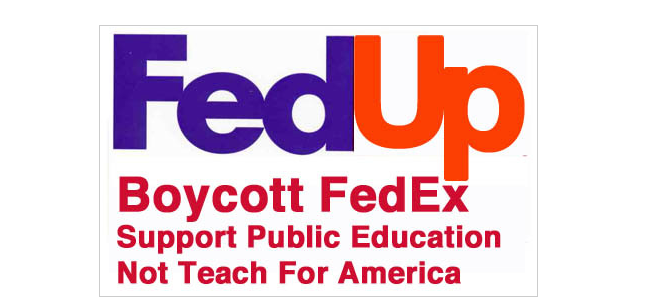Get Up, Stand Up: Boycott FedEx for their Hypocrisy and Support of TFA

Today a reader gave me the heads up that FedEx wants to make a $300,000 commitment to Teach For America (TFA). (See http://blog.van.fedex.com/countlesspossibilities) They will donate a dollar of every One Rate transaction (Their attempt to compete with the US postal service Priority Mail). They call this effort #countlesspossibilities. I have written extensively about TFA’s temporary agency approach for poor kids. See my editorial in the New York Times entitled A Glorified Temp Agency. (For all of Cloaking Inequity’s posts on TFA click here) Also, in January 2014, NEPC will release the new policy brief entitled Teach For America: A Return to the Evidence, the sequel to Teach For America: A review of the evidence
I was wondering, who does FedEx hire to do their Technology, Human Resources, Communications and Solution work? Core functions of teachers and important roles in the FedEx corporation. Do you think they hire individuals with a college degree and only five weeks of training? Or do you think they search for experienced individuals for their company? I did a little research in the careers section of the FedEx website for jobs that required at least a Bachelor’s degree and here is what I found:
Table 1. FedEx open positions as of 12/14/2013
| Solutions | |||
| 20132 | Sales Exec-Freight | GA-Atlanta | 3 |
| 20282 | WW Account Manager | TX-Houston |



